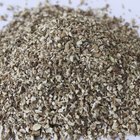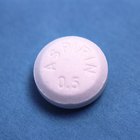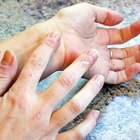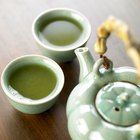
Eczema is a skin condition characterized by thick, itchy, scaly rashes. Sufferers are often embarrassed by their condition. According to the National Institutes of Health, eczema most often runs in families and is caused by a hypersensitivity reaction to an allergen. This immune overreaction leads to long-term skin inflammation. White distilled vinegar and apple cider vinegar offer relief for eczema sufferers.
Topical Application
Applying apple cider vinegar directly to the skin provides eczema sufferers with relief. Dean Myles of “The Herbal Dispatch," published by the Medicinal Botanicals Program at Mountain State University, recommends a 50/50 solution of water and apple cider vinegar be applied to the skin. However, if your skin is more sensitive, you may want to try a more diluted solution of 1 tbsp of apple cider vinegar mixed with 1/2 cup of water, which can be applied to the affected area. Use either a clean wash cloth or pour the solution into a spray bottle to spritz onto the skin.
Vinegar Bath
For eczema that is more widespread, a vinegar bath can offer relief. Add 1/2 cup of apple cider vinegar to warm or tepid bath water. Make sure the water is not to hot, as this can irritate and scald already delicate skin tissues. Adding approximately 1/3 cup of sunflower or safflower oil to the bath will treat the intensely dry skin patches eczema sufferers often endure.
Oral Solution
Drinking apple cider vinegar is also beneficial for the skin. Mix a solution of 1 to 2 tbsp of apple cider vinegar into a cup of water three times each day. You can add a couple of tablespoons of honey, to taste, if you find the flavor to be to strong. However, taking apple cider vinegar orally is not for everyone. Due to its high acidity, those with chronic indigestion, heart burn or peptic ulcers should consult with their physician prior to taking apple cider vinegar. It is also unknown if apple cider vinegar is safe to take while pregnant or breastfeeding.
In the Laundry
The residue of soaps and detergents, as well as dyes and fragrances, are known to irritate and even cause outbreaks of eczema. Eczema sufferers should use mild detergents free of irritants. fabric softeners often have both dye and chemical scents. White distilled vinegar is a natural fabric softener. Add 1/2 cup during the wash cycle. However, never mix vinegar and bleach, as it produces toxic fumes.
Related Articles

Chamomile Essential Oil Benefits

What Are the Benefits of Ashwagandha in ...

Uses for Castor Oil on the Skin

How to Get Rid of Irritation From ...

How to Remove the Smell of Cologne From ...

Dandelion Root for Reduced Acne Symptoms

How to Remove Yellow Stains on White ...

Fraxel Repair Vs. Restore Results

Homemade Remedies With Turmeric

Fraxel Laser Treatment Dangers

Saltwater for Acne

How to Remove Ointments

How to Get Mold & Mildew Stains Out of ...

How to Mix & Safely Use Patchouli ...

List of Retinoids

How to Remove Sweat Smell From Shirts

Is It Better to Wash Your Face With Hot ...

Are Apple Cider Vinegar & Green Tea ...

The Best Way to Remove Hair Dye

Toxicity of Peppermint Oil
References
Writer Bio
Melanie Clatfelter began writing in 2010 for various websites. She earned her Associate of Arts from Florida State University in 1996, concentrating in biological sciences. After working for five years in early childhood education, Clatfelter earned her diploma in practical nursing from Central Carolina Community College in 2009 and is now a licensed practical nurse in North Carolina.
Photo Credits
Hemera Technologies/AbleStock.com/Getty Images